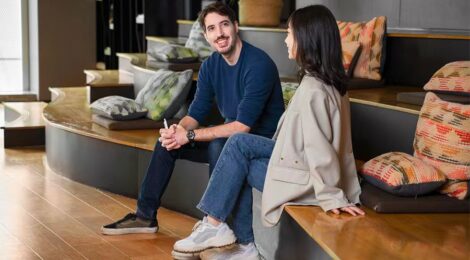
Galilei Circle of Friends – Interview with Gianluca Fracasso

Gianluca Fracasso is a Marketing, Communication, HR Strategist with 12+ years on-the-ground experience in China Tech and advertising.
Currently in charge of Employer Branding Strategy for Tencent, Gianluca’s work has been helping the company to champion and revamp its international communication outside of China.
Previous experiences include the Senior Content Strategy role for Alibaba’s AliExpress Localization (2018-2021) and various years of Creative & Media agencies, including a tenure at Dentsu International.
His work in communications has been recognized by many industry awards, such as the Mumbrella 2017 for ‘Best Campaign of the Year’ for Oreo.
Gianluca is also active as a cross-cultural trainer, speaker and startup advisor, also through non-profit projects (LivAway) and various other platforms like the University of Hong Kong, and Government Organizations.

PERSONAL RELATIONSHIP WITH CHINA
How did your experience with China begin? Was it by chance, for business or simply by pleasure?
I grew up with a deep fascination for the Far East in general. As a kid, I was an avid gamer, and at that time Japan was a huge producer of videogames and pop culture. My hometown, Udine, has also been hosting a major Asian Film Festival for years (the Far East Film Festival).
That gave me an early exposure to China and Japan.
So at age 19, I decided to study Chinese & Japanese Cultures at University of Urbino, and at 21 I had my first trip to China. I have now spent a third of my life in China!
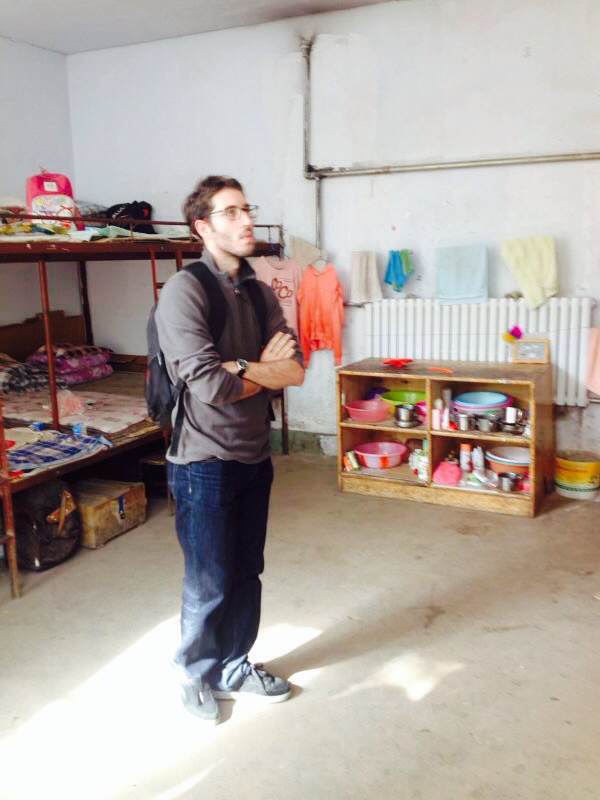
In 2013 I took a break from work and spent 2 months backpacking in Yunnan and Sichuan, living off my backpack, no flights allowed. Great way to visit and understand the country (2013)
How has your relationship with China evolved over time?
The first trips were mostly casual, study trips. Pretty carefree and fun, so to say. I also spent time backpacking in the North-East, and Yunnan-Sichuan, so that was until I was 24-25 years old. My initial approach to China was more like a curious observer.
Gradually I took a more serious interest into developing a ‘China career’, which means investing time and energy in building relationships and blend into the local culture. Now I have a family here, so I see China has a part of my own identity, with the challenges and rewards that come with it, and its beautiful contradictions.
What has your personal experience in this beautiful country taught you?
You need to step out of your comfort zone – that’s where the magic happens. You cannot spend your whole life into your own little culture, in your little town, in your circle of friends. You need to go out and see the world.
China is truly different, on many levels, and it takes time and effort to function and succeed as a foreigner.
So for me, that’s been the ultimate life lesson. Even living in Shanghai, to some extent, represented a comfortable bubble for me. You can’t really say you fully understand China if you have only lived in the Shanghai expat community. So I am proud to have lived and worked also in Beijing, Hangzhou, Qingdao, Suzhou, and now Shenzhen.
It’s quite uncommon to find a foreigner in China with such a diversified experience!
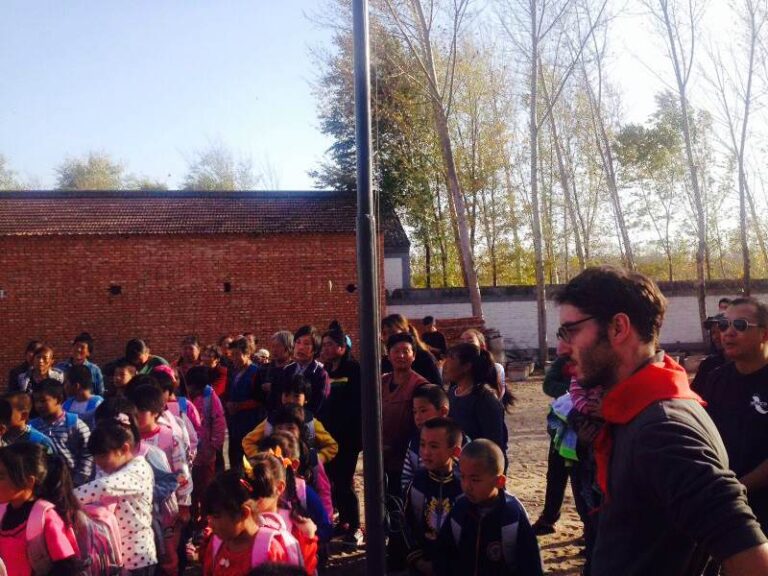
Social work: Helping children in rural communities of Hebei province (2014)
BUSINESS – Working experience in China
How has China changed compared to its early years from the point of view of business in its specific sector? What are the differences that most impressed you positively and negatively?
For years, Italians have seen China as just a ‘Copy cat’, and the world’s factory, with a focus on manufacturing. Through my work experiences in Alibaba and Tencent, I have seen first-hand that China has already proved to be an innovative country, with lots of creative potential in new industries.
So I think there are lots of interesting things going on in design, and software. There is a new wave of Chinese brands that are redefining industries, like BYD or NIO in Electric Vehicles.
I am now eager to see, for example in videogames and entertainment, if we’ll start to see more interesting Chinese IPs (Intellectual Property) coming out, like the case of ‘Genshin Impact’, which it’s been having some success in the West. Or ‘Wandering Earth’, which has been a good success also outside of China, as a work of Science Fiction.
Tell us about your experience at Tencent. What was your role and what are the main results you have achieved over the years?
My role at Tencent is a hybrid function between HR and Marketing. I am in charge of Employer Branding outside of China. That means using brand, content strategy and social media to position Tencent as an interesting and attractive company to work for.
I am developing a strategy to enrich our brand storytelling, so that potential candidates do not see us as just a ‘Chinese Company’ but rather as an appealing, international career option.
I think we are now in the Top 3 most followed Chinese Brand on LinkedIn, so we hope to keep up with the momentum and build a stronger talent community, which in turn will fuel the Tencent internationalization (outside of China).
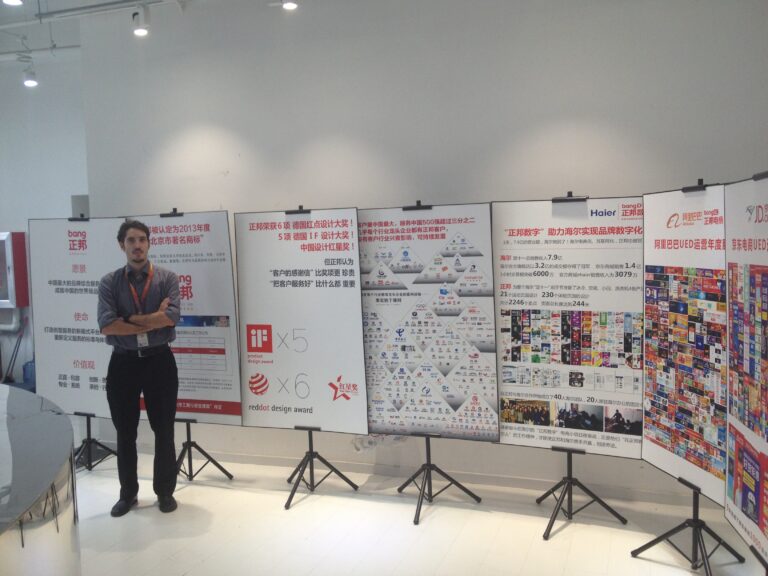
My career is rooted in advertising, this above was taken in Beijing – consulting clients on Brand Strategy & Design (2015)
How important is knowing the local culture and language in your business?
It’s been fundamental. Simply put, you cannot really work in China Tech without some knowledge of Mandarin. The equation is simple: the better your Chinese skills, the more things you’ll be able to achieve in a company like Alibaba or Tencent.
Have you noticed any changes in recent years compared to your arrival from a professional point of view? If yes, which were the most significant?
When I arrived in Shanghai, in 2011, the top of the workforce and decision-makers were often made up of foreign expats, bringing their brands to China. Now this trend has changed, as growth as slowed down for many foreign brands, which meanwhile have fully localized their operations on channel like Tmall/WeChat/BiliBili/XiaohongShu etc. Covid has been a watershed moment to some extent.
Now it’s the turn of Chinese companies to go global, hence Alibaba/Tencent/Bytedance and all the others, with Chinese leaders sitting in cities like Hangzhou, Shenzhen, Wuhan, Chongqing, strategizing on how to “go overseas” (出海)。
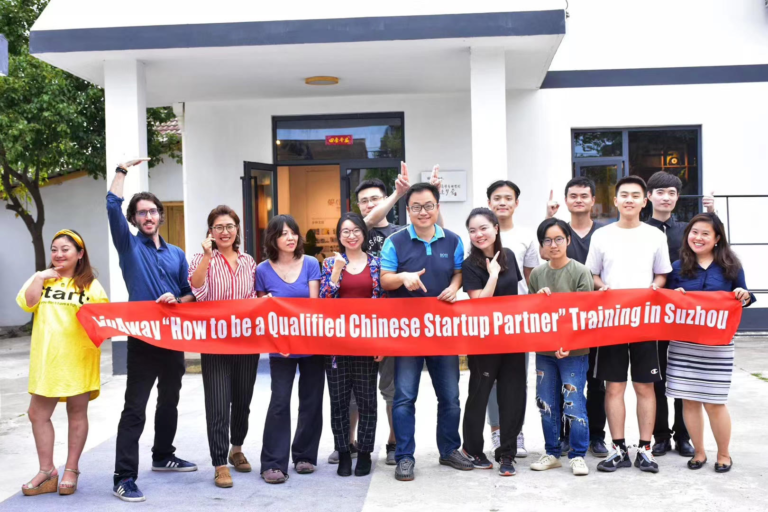
I have done mentorship and training for several platforms, such as LivAway, which I co-founded (2019)
As for your current company, what are the projects you are focusing on and your future goals?
Tencent is working on the development of high quality videogames, Triple-A titles, and the development of strong titles/IPs that can leave their mark on the industry, building on their experience in launching successful Chinese titles like ‘Honor Of Kings’ (王者荣耀) and others.
We have built a network of game studios all over the world, so it will be interesting to follow what happens in the industry.
How has the pandemic affected your business and what strategies have you implemented to respond to the crisis?
Many Software companies responded quite well to the crisis. That’s because we have the tools for remote work, to some extent, with softwares like DingTalk, WeChat, WeCom.
On a deeper/cultural level, it’s been more challenging. Leaders need to figure out how to engage with their team from a distance. ‘Work for home’ is not an option for most Chinese companies, but I also see that the virus brought some flexibility, which is good.
What are the main challenges you have encountered in your experience as a successful manager in China? What are the positive surprises?
As a young foreigner in China, you are somewhat of an outsider (especially in a Chinese Company). You need to accept that reality. Don’t come here and introduce yourself as an ‘Expert’. Stay humble, and learn/adapt to the Chinese way of doing things, have an open mind, that may be quite beneficial in the long-term.
In my experience, ‘Building relationships’ has been quite difficult, as the market here is quite ‘volatile’. After Covid, even more so… But yet, I think it’s still important. China may seem huge, but it’s not, so you’ll be surprised by the importance of having and maintaining a good reputation in your industry. That can open many doors.
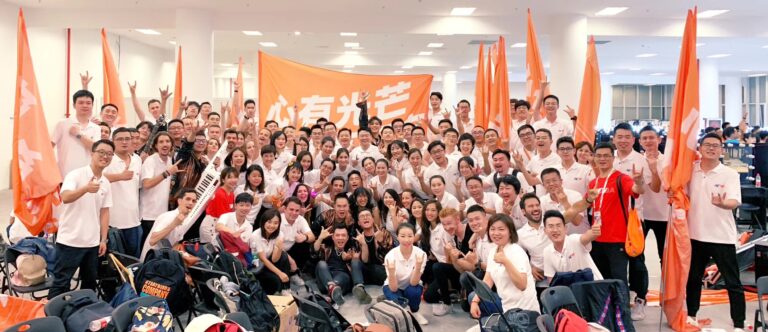
During my time at Alibaba, I got to perform on stage right after Jack Ma’s famous Retirement Speech at the Hangzhou Olympics Stadium (2019).
How important is the role of technology in your business? From this point of view, is being able to operate in China an advantage for your company?
Technology is everything, and ‘online’ has now taken over ‘offline’. When living in China, you are continuously using the Alibaba or Tencent app ecosystems throughout your day, for payments, booking ticket, shopping, watching drama or playing games. We spend more time ‘connected’ to a device, than ‘disconnected’ overall.
It’s very efficient for a populous country, as it allows to scale and move many processes online. There is a vast amount of data being collected, which obviously is one of the strengths of BAT (Bytedance-Alibaba-Tencent) in the domestic market.
You know, as an Italian, I used to be quite a ‘late adopter’ of high tech, but living in China has changed my perspective. Technology can be our ally if used properly. Obviously, we still need be mindful and set boundaries…
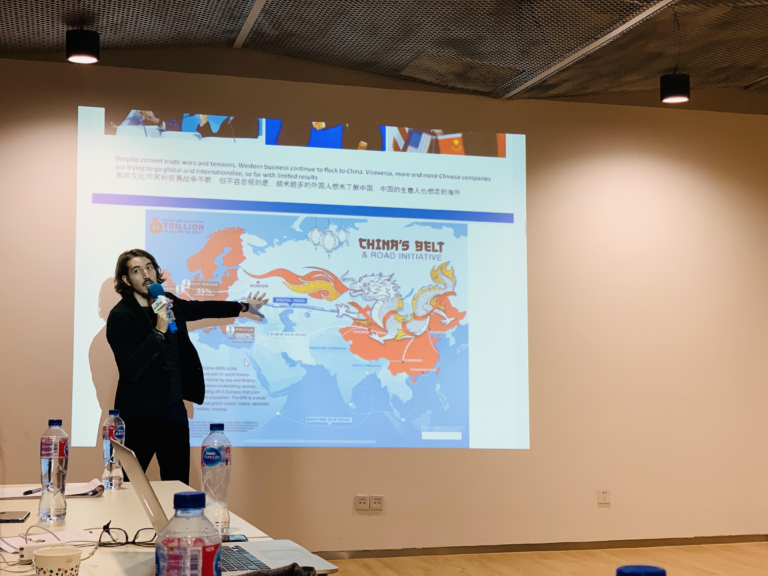
Among various events, I also got to speak about China’s Globalization and ‘Designed in China’ to local government bodies, as the new trend is to go ‘outbound’, go global (2019)
GOING EAST – Why is China an opportunity for an Italian manager?
Are you already present in Chongqing or in the Chengdu-Chongqing economic circle?
Tencent China is mostly active from their Shenzhen Headquarters. We have a few branches, which includes a small Chengdu office, but the core teams & decision-makers are in Shenzhen.
How can Galilei and Sant’Anna in Chongqing possibly be useful to your company in China and Italy?
Italy is not a target market for Tencent, but we could think of some kind of training or knowledge sharings, such as helping Italians understand the Tencent Ecosystem, or understand their unique investment portfolio in videogames.
Vice versa, I think some Chinese managers could benefit from understanding more in terms of ‘Made in Italy’, design and innovation, how to create a successful brand. That would be very useful to a Chinese audience, in my opinion.
Note: Opinions expressed are solely Gianluca’s own and do not express the views or opinions of his employer.
Interview by Marco Bonaglia
Gianluca’s LinkedIn Page: https://www.linkedin.com/in/glfracasso/

The Covid crisis has changed and redesigned the life of us foreigners in China, and it has also impacted some of my personal projects.
This picture was my first day back to the Alibaba office, March/April 2020, only 50% occupancy was allowed. (2020)



